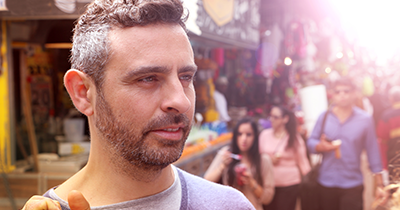Travel Abroad
Fast Facts
-
- Before you go on a trip outside the United States, talk to your doctor about your destinations and planned activities.
- Take special care with food and water.
- Protect your health (and the health of others) just as you do at home.
 Each year, millions of Americans travel abroad. Even though travel outside the United States can be risky for anyone, it may require special precautions for individuals living with HIV infection. For example, travel to some developing countries can increase the risk of getting an opportunistic infection. For some destinations, certain vaccines that contain live viruses may be required, and your health care provider needs to review your medical record to ensure they are safe for you.
Each year, millions of Americans travel abroad. Even though travel outside the United States can be risky for anyone, it may require special precautions for individuals living with HIV infection. For example, travel to some developing countries can increase the risk of getting an opportunistic infection. For some destinations, certain vaccines that contain live viruses may be required, and your health care provider needs to review your medical record to ensure they are safe for you.
The most important things you can do is see your health care provider before you travel, know the medical risks you might face, and learn how to protect yourself.
Before You Travel
- Talk to your health care provider or an expert in travel medicine about health risks in the places you plan to visit. Ideally, this conversation should take place at least 4-6 weeks before your scheduled departure. Your health care provider can advise you on preventive medicines you may need, specific measures you need to take to stay healthy, and what to watch out for. He or she may also be able to provide you with the name(s) of health care providers or clinics that treat people with HIV infection in the region you plan to visit. Your health care provider may also:
- recommend you pack a supply of medicine, such as antibiotics to treat travelers’ diarrhea;
- recommend certain vaccinations.
- Consult CDC Health Information for International Travel (commonly called the Yellow Book). The section on Immunocompromised Travelers has an extensive amount of information that may be useful for you. Make sure your health care provider knows about this source of information.
- If you are traveling to an area where insect-borne diseases (such as dengue fever, yellow fever, or malaria) are common, minimize the risk of getting bitten by mosquitoes or ticks. Remember to:
- Pack a good supply of insect repellant that contains at least 30 percent DEET;
- Wear lightweight long pants and shirts with long sleeves;
- Wear a hat and inspect your scalp and body daily for ticks.
- You doctor may also recommend:
- Sleeping under a mosquito net to prevent mosquito bites;
- Taking medicine to prevent getting malaria.
- Educate and prepare yourself
- About your destination: Make sure you know if the countries you plan to visit have special health rules for visitors, especially visitors with HIV infection.
- About your insurance policies:
- Review your medical insurance to see what coverage it provides when you are away from home. You may purchase supplemental traveler’s insurance to cover the cost of emergency medical evacuation by air and the cost of in-country care, if these costs may are not covered by your regular insurance.
- Take proof of insurance, such as a photocopy or scan your policy and send the image to an e-mail address you can access both in the United States and abroad. Leave a copy at home and tell your friends or family where it is located.
When You Travel Abroad
-
 Food and water in developing countries may contain germs that could make you sick.
Food and water in developing countries may contain germs that could make you sick.
- Do not
- eat raw fruit or vegetables that you do not peel yourself;
- eat raw or undercooked seafood or meat;
- eat unpasteurized dairy products;
- eat anything from a street vendor;
- drink tap water (in developing countries some hotels may purify their own water but it is safer to avoid it), drinks made with tap water, or ice made from tap water.
- Do eat and drink:
- hot foods;
- hot coffee or tea;
- bottled water and drinks (make sure the seals are original and have not been tampered with);
- water that you bring to a rolling boil for one full minute then cool in a covered and clean vessel;
- fruits that you peel;
- wine, beer and other alcoholic beverages are also safe.
- Do not
- Tuberculosis is very common worldwide, and can be severe in people with HIV. Avoid hospitals and clinics where coughing TB patients are treated. See your doctor upon your return to discuss whether you should be tested for TB.
- Animal wastes, such as fecal droppings in soil or on sidewalks, can pose hazards to individuals with weakened immune systems. Physical barriers, such as shoes, can protect you from direct contact. Likewise, towels can protect you from direct contact when lying on a beach or in parks. If you are in physical contact with animals, wash your hands thoroughly afterwards with soap and water.
- Take all your medications on schedule, as usual.
- Stick to your special diet, if you are on one.
- Take the same precautions that you take at home to prevent transmitting HIV to others.
Resources
CDC’s Travelers’ Health pages contains find information on
- travel clinics near you;
- travel notices for your destination;
- recommended vaccinations and precautions for your destination.
CDC Health Information for International Travel (commonly called the Yellow Book) has a special section on Immunocompromised Travelers that is useful for health care professionals as well as consumers. Additionally, the section on Travel-Related Exposures in the Guidelines for the Prevention and Treatment of Opportunistic Infections in HIV-Infected Adults and Adolescents may be useful.
Content provided and maintained by the US Centers for Disease Control and Prevention (CDC). Please see our system usage guidelines and disclaimer.
- Page last reviewed: July 7, 2016
- Page last updated: July 7, 2016
- Content source:


 ShareCompartir
ShareCompartir